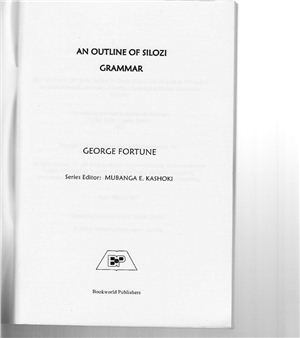Bookworld Publ., 2002. - 120 p.
ISBN-10 / ASIN: 9982241591
ISBN-13 / EAN: 9789982241595
First published as a chapter in Language in Zambia: Grammatical Sketches by the Institute of African Studies (now the Institute of Economic and Social Research) in 1977, this is the second in a series of individual publications on Zambian languages and grammar. The intention of the series is to boost the meagre scholarship and availability of educational materials on Zambian languages, which became particularly in urgent in 1996, following the decision of the Zambian govement to revert to the policy of using local languages as media of instruction. This volume provides a grammatical sketch of Lozi, a language related to the Sotho language group, and one of the languages spoken as the lingua franca all over the Weste Province of Zambia. It is spoken on the central Barotse plain to the north and south of Mongu and on either side of the Zambezi river, all the way to Livingstone, where it is the main African language in use, and a considerable distance inland. It is the second administrative language of the country after English. The study provides a comprehensive survey of all the major grammatical features of the language.
ISBN-10 / ASIN: 9982241591
ISBN-13 / EAN: 9789982241595
First published as a chapter in Language in Zambia: Grammatical Sketches by the Institute of African Studies (now the Institute of Economic and Social Research) in 1977, this is the second in a series of individual publications on Zambian languages and grammar. The intention of the series is to boost the meagre scholarship and availability of educational materials on Zambian languages, which became particularly in urgent in 1996, following the decision of the Zambian govement to revert to the policy of using local languages as media of instruction. This volume provides a grammatical sketch of Lozi, a language related to the Sotho language group, and one of the languages spoken as the lingua franca all over the Weste Province of Zambia. It is spoken on the central Barotse plain to the north and south of Mongu and on either side of the Zambezi river, all the way to Livingstone, where it is the main African language in use, and a considerable distance inland. It is the second administrative language of the country after English. The study provides a comprehensive survey of all the major grammatical features of the language.

